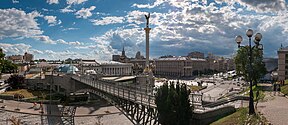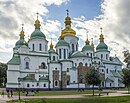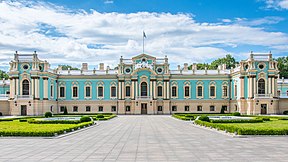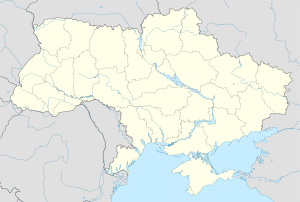Kyiv
Київ Kiev | |
|---|---|
| Nickname: | |
| Anthem: How Can I Not Love You, Kyiv of Mine! | |
 Interactive map of Kyiv | |
| Coordinates: 50°27′00″N 30°31′24″E / 50.45000°N 30.52333°E | |
| Country | Ukraine |
| Municipality | Kyiv |
| Founded | 482 CE (officially)[3] |
| Named for | Kyi |
| City council | Kyiv City Council |
| Districts | |
| Government | |
| • Mayor and Head of City State Administration | Vitali Klitschko[4][5] |
| Area | |
| 839 km2 (324 sq mi) | |
| Elevation | 179 m (587 ft) |
| Population (1 January 2021) | |
| • Rank | 1st in Ukraine 7th in Europe |
| • Density | 3,299/km2 (8,540/sq mi) |
| • Metro | 3,475,000[6] of the Kyiv metropolitan area |
| Demonym(s) | Kyivan,[7][8] Kievan[9]
Киянин, Киянка (uk) |
| GDP | |
| • Capital city and city with special status | ₴1.28 trillion (US$46.76 billion) (2021) |
| • Per capita | ₴431,616 (US$15,815.9) (2021) |
| Time zone | UTC+2 (EET) |
| • Summer (DST) | UTC+3 (EEST) |
| Postal code | 01xxx–04xxx |
| Area code | +380 44 |
| ISO 3166 code | UA-30 |
| Vehicle registration plate | AA, KA (before 2004: КА, КВ, КЕ, КН, КІ, KT) |
| FIPS code | UP12 |
| Website | kyivcity.gov.ua |
Kyiv (also Kiev)[a] is the capital and most populous city of Ukraine. It is in north-central Ukraine along the Dnieper River. As of 1 January 2022, its population was 2,952,301,[2] making Kyiv the seventh-most populous city in Europe.[11] Kyiv is an important industrial, scientific, educational, and cultural center in Eastern Europe. It is home to many high-tech industries, higher education institutions, and historical landmarks. The city has an extensive system of public transport and infrastructure, including the Kyiv Metro.
The city's name is said to derive from the name of Kyi, one of its four legendary founders. During its history, Kyiv, one of the oldest cities in Eastern Europe, passed through several stages of prominence and obscurity. The city probably existed as a commercial center as early as the 5th century. A Slavic settlement on the great trade route between Scandinavia and Constantinople, Kyiv was a tributary of the Khazars,[12] until its capture by the Varangians (Vikings) in the mid-9th century. Under Varangian rule, the city became a capital of Kievan Rus', the first East Slavic state. Completely destroyed during the Mongol invasions in 1240, the city lost most of its influence for the centuries to come. Coming under Lithuania, then Poland and then Russia, the city would grow from a frontier market into an important centre of Orthodox learning in the sixteenth century, and later of industry, commerce, and administration by the nineteenth.[1]
The city prospered again during the Russian Empire's Industrial Revolution in the late 19th century. In 1918, when the Ukrainian People's Republic declared independence from the Russian Republic after the October Revolution there, Kyiv became its capital. From the end of the Ukrainian-Soviet and Polish-Soviet wars in 1921, Kyiv was a city of the Ukrainian SSR, and made its capital in 1934. The city suffered significant destruction during World War II but quickly recovered in the postwar years, remaining the Soviet Union's third-largest city.
Following the collapse of the Soviet Union and Ukrainian independence in 1991, Kyiv remained Ukraine's capital and experienced a steady influx of ethnic Ukrainian migrants from other regions of the country.[13] During the country's transformation to a market economy and electoral democracy, Kyiv has continued to be Ukraine's largest and wealthiest city. Its armament-dependent industrial output fell after the Soviet collapse, adversely affecting science and technology, but new sectors of the economy such as services and finance facilitated Kyiv's growth in salaries and investment, as well as providing continuous funding for the development of housing and urban infrastructure. Kyiv emerged as the most pro-Western region of Ukraine; parties advocating tighter integration with the European Union dominate during elections.
- ^ a b "Kyiv – History". Encyclopædia Britannica. Archived from the original on 4 May 2015. Retrieved 9 March 2020.
- ^ a b "Number of present population of Ukraine 1 January 2022" (PDF) (in Ukrainian). UkrStat.gov.ua. 1 January 2022. Archived (PDF) from the original on 10 August 2022. Retrieved 20 February 2023.
- ^ Oksana Lyachynska (31 May 2012). "Kyiv's 1,530th birthday marked with fun, protest". Kyiv Post. Archived from the original on 1 June 2014. Retrieved 16 May 2013.
- ^ Cite error: The named reference
KKMs5614was invoked but never defined (see the help page). - ^ Cite error: The named reference
Poroshenko appoints Klitschko head of Kyiv city administration - decreewas invoked but never defined (see the help page). - ^ "Major Agglomerations of the World". Citypopulation.de. 1 January 2021. Archived from the original on 23 November 2019. Retrieved 23 September 2021.
- ^ "Definition of KYIV". Merriam-Webster.com Dictionary. Archived from the original on 28 September 2022. Retrieved 11 May 2023.
- ^ "Kyiv definition and meaning". Collins English Dictionary. Archived from the original on 28 November 2022. Retrieved 11 May 2023.
- ^ kievan. (n.d.). Dictionary.com Unabridged Archived 14 March 2013 at the Wayback Machine, retrieved 29 May 2013 from Dictionary.com
- ^ "ВАЛОВИЙ РЕГІОНАЛЬНИЙ ПРОДУКТ У 2021 РОЦІ". ukrstat.gov.ua.
- ^ "City Mayors: The 500 largest European cities (1 to 100)". www.citymayors.com. Archived from the original on 2 January 2010. Retrieved 19 February 2017.
- ^ "Kiev". TheFreeDictionary.com. Archived from the original on 5 August 2018. Retrieved 4 July 2015.
- ^ Magocsi, Paul Robert (2010). A History of Ukraine: The Land and Its Peoples (2nd, Revised ed.). University of Toronto Press. p. 481. ISBN 978-1-4426-9879-6. Archived from the original on 14 June 2020. Retrieved 9 September 2017.
Cite error: There are <ref group=lower-alpha> tags or {{efn}} templates on this page, but the references will not show without a {{reflist|group=lower-alpha}} template or {{notelist}} template (see the help page).










